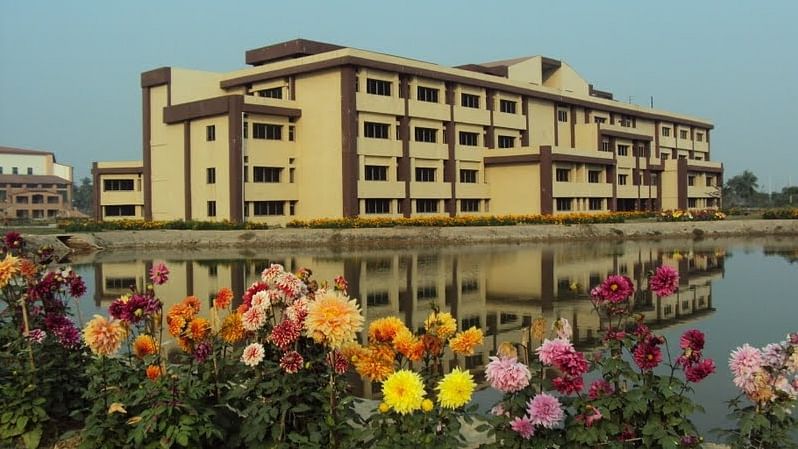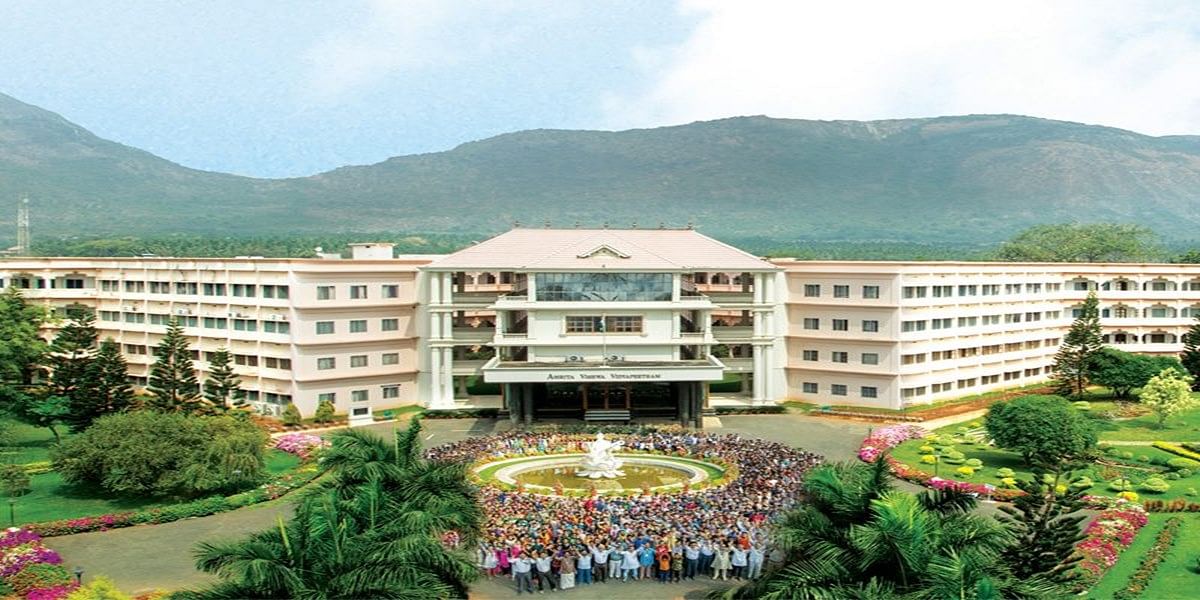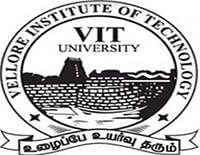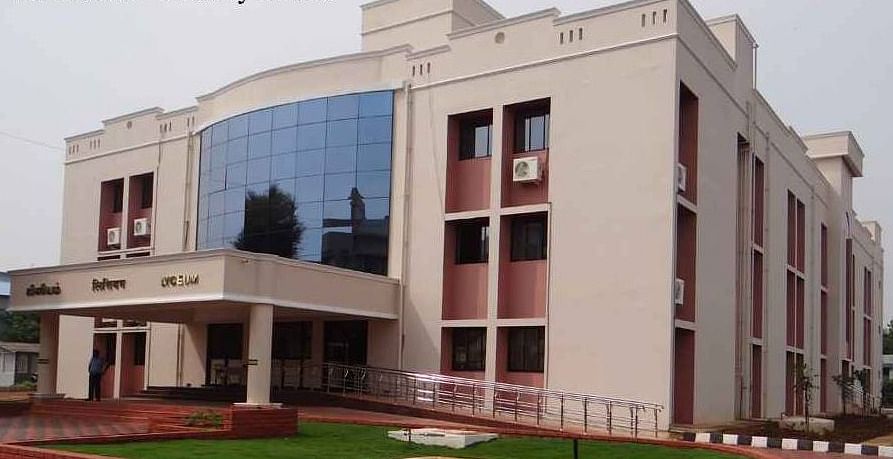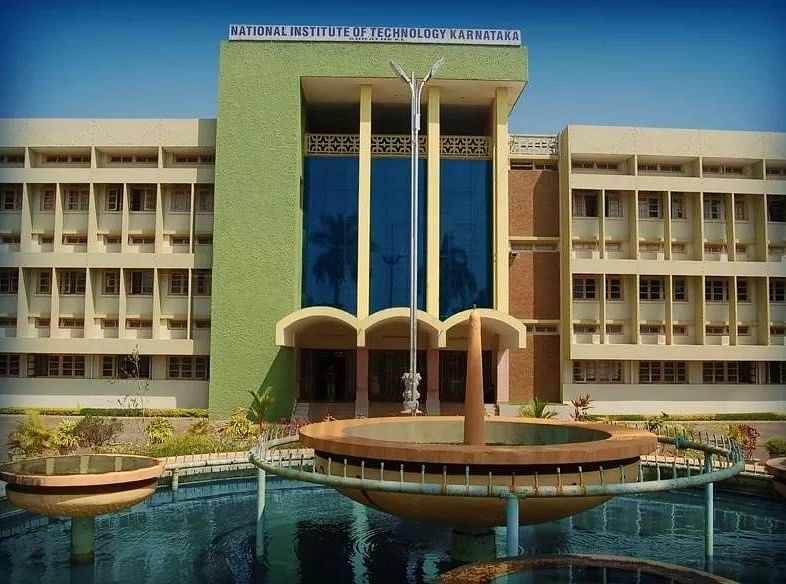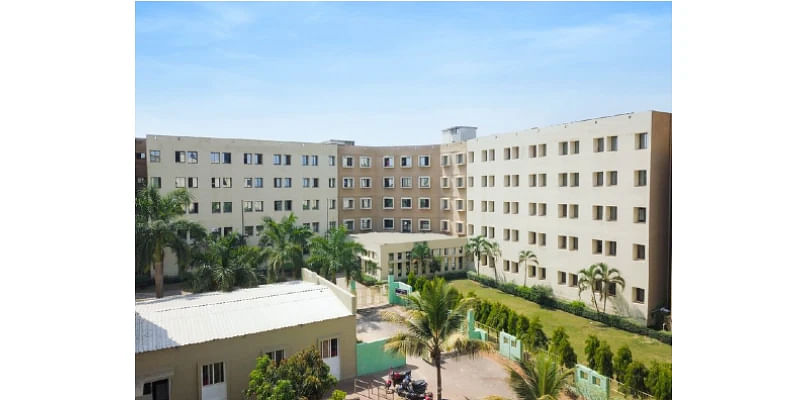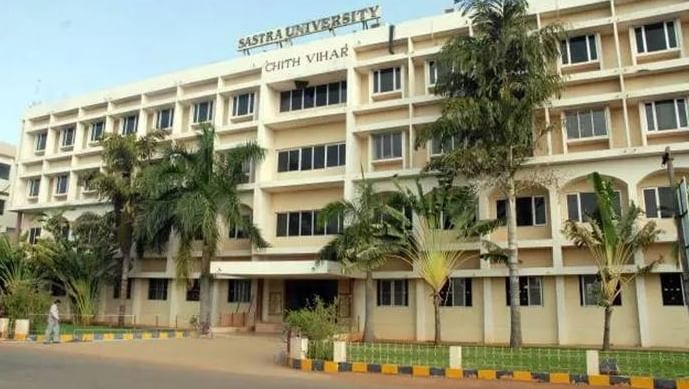B.Tech EEE: Course Details, Eligibility, Fees, Admission

B.Tech Electrical and Electronics Engineering is a 4-year undergraduate course that deals with the study of electricity, electromagnetism, and their applications in various domains such as transport, appliances, machinery, etc. After completing B.Tech EEE in India, graduates can pursue further education, research-based work, or job opportunities in government or private firms.
Table of Contents
- About B.Tech in EEE
- Eligibility Criteria for B.Tech EEE
- Who Should Pursue B.Tech EEE?
- How To Get Admission for B.Tech EEE?
- Types of B.Tech EEE
- Popular Entrance Exams for B.Tech EEE
- Top 10 B.Tech EEE Colleges in India
- Study B.Tech EEE Abroad
- Fee Structure for B.Tech in EEE
- B.Tech EEE Course Comparison
- Syllabus and Subjects for B.Tech in EEE
- Why Choose B.Tech in EEE?
- Preparation Tips for B.Tech in EEE
- Scope For Higher Education
- Salary of a B.Tech Electrical and Electronics Engineer
- Career Options After B.Tech EEE
- Skills That Make You The Best Electrical and Electronics Engineer
B.Tech Electrical and Electronics Engineering Course Details
| Degree | Bachelors |
| Full Form | Bachelor of Technology in Electrical and Electronics Engineering |
| Duration | 4 Years |
| Age | No age limit |
| Minimum Percentage | 50% - 60% in 10+2 with Physics, Chemistry, and Mathematics as compulsory subjects |
| Average Fees | ₹25K - 2.5 LPA |
| Average Salary | INR 3 - 10 LPA [Source: AmbitionBox] |
| Employment Roles | Electrical Engineer, Software Engineer, Senior Software Engineer, Senior Electrical Engineer, Systems Engineer, Software Developer, Electrical Design Engineer, Project Engineer, Test Engineer etc. |
About B.Tech in EEE
B.Tech EEE full form is a Bachelor of Technology in Electrical and Electronics Engineering course that equips the students with the knowledge and skills required to work in the field of electrical and electronics. B.Tech EEE focuses on the branch of engineering that deals with the technology of electricity, especially the design and application of circuitry and equipment for power generation and distribution, machine control, and communications.
B.Tech EEE subjects like digital circuits, integrated circuits, electromagnetic field theory, and microprocessors help the aspirants gain a sound knowledge of the specialized topics in the electrical and electronics engineering discipline.
B.Tech EEE job scope is spread across different areas such as railways, IT, telecommunications, the army, automobiles, and many more.
Essential tools and technologies used by electrical and electronic engineers:
- Voltmeter
- Socket Set
- Current Probes
- MATLAB
- Arduino
- PartSim Simulator
- AutoCAD
- Atmel Studio
Eligibility Criteria for B.Tech EEE
The eligibility criteria for B.Tech EEE aspirants is that they should have passed 10+2 with 50% of the total aggregate with a combination of Physics, Chemistry and Mathematics. Post the completion of 10+2; the aspirants are required to qualify for one of the national or state-level entrance exams as specified by the university of their choice. The board exam score, entrance exam cut-off, and additional criteria may vary from one university to another. Lateral admission to the second year of B.Tech EEE is available to those who have completed a Diploma in EEE and other associated streams post Class 10. The students should not have pending compartment exams in any of the subjects in 10+2/Diploma level during admission to B.Tech EEE. Aspirants belonging to the reserved category need to present their reservation certificate issued by the respective authorities to benefit.
Who Should Pursue B.Tech EEE?
B.Tech EEE is the training and imparting knowledge about electronics and electrical engineering and all the related topics. Candidates wishing to pursue a B.Tech EEE should have the following:
- A keen interest in education.
- Candidates are interested in careers such as electrical engineering, IT and telecommunications.
- It is also the best option for candidates working in education fields.
When To Do B.Tech EEE?
B.Tech EEE provides a variety of career opportunities on a national and international level. A B.Tech EEE can be pursued at any time. A few factors that affect B. Tech EEE includes the ones listed below:
- One can pursue the course right after completing 10+2.
- Before enrolling in a B.Tech EEE course, it is advisable to do some research about the subject and understand its depth.
How To Get Admission for B.Tech EEE?
Admission to the B.Tech EEE course is based on the entrance exam and board exam scores. Some of the entrance exams are common for all B.Tech programs—for example, JEE. However, like the SRM and BITS, individual universities require aspiring students to qualify for specific entrance exams. The cut-offs vary depending on the university of choice.
Management quota is another way to get admission to the B.Tech EEE course in some private engineering colleges. Here, the aspirant is required to pay a lump-sum donation fee to secure their seat.
Once the entrance exam results are declared, the universities announce their cut-off and begin the admission process. The course falls under the umbrella of B.Tech and therefore, follows a similar admission procedure. Though there is variation in the admission process, here are the general steps one needs to follow to get admitted:
How to Apply?
Due to the current pandemic situation, colleges are taking admissions online. The aspirant needs to visit the college’s official website and submit the required details such as name, contact number, course name, etc. Alternatively, one can register offline by visiting the college in person, filling out the application form and submitting the necessary documents.
Selection Process
After the application is accepted, some colleges may conduct a final round of group discussions or interviews. The selection process differs from one college to another.
Read More on B.Tech Admission
Check other important B.Tech Courses
Types of B.Tech EEE
Aspirants can pursue the course in full-time or part-time mode. Below are the types of B.Tech EEE courses in detail:
Full-Time
A two-year, full-time B.Tech EEE is available. Practical knowledge is more important than theoretical understanding in this line of work. A full-time course allows students to connect closely with teachers and other students, thus expanding their exposure, experience, and knowledge.
Part-Time
There is a part-time B.Tech EEE. In this line of business, practical expertise supersedes theoretical comprehension. The advantage of a part-time B.Tech EEE is, it allows candidate flexibility to work while studying.
Distance
When pursuing a B.Tech EEE after having a bachelor's degree but lacking the time to attend traditional sessions, distance learning is the ideal option. Depending on the candidate's schedule, it takes two or three years to finish.
Popular Entrance Exams for B.Tech EEE
Engineering is one of the most popular courses taken by students after Class 12. The primary selection procedure for undergraduate engineering courses in India involves entrance exams. To appear for the entrance exams, the aspirant must have passed Class 12 with physics, mathematics and chemistry as compulsory subjects.
The entrance exams are the same for all specializations of engineering. Please note that some colleges require aspirants to qualify for specific entrance exams. The cut-offs and other criteria may vary based on the chosen discipline and college. To secure admission to renowned Indian institutes, aspirants will have to perform well in the entrance exams and ensure good ranks.
A merit list of qualified applicants is published after the exam, and the college or university invites them for the admission procedure. Post the admission process, the seats are allotted, and students are asked to pay the fees and register for the academic year.
Below is a list of the most popular engineering entrance exams:
- JEE Main
- MHT CET
- JEE Advanced
- SRMJEEE
- BITSAT
- SET
- GUJCET
- IMU CET
- LPUNEST
- SAAT
- KEAM
- TANCET
- BCECE
- TS EAMCET
A Quick Glance at the B.Tech EEE Entrance Exams
The eligibility criteria for the entrance exams mentioned above vary according to the respective conducting bodies. A few commonalities of these popular entrance exams are listed below:
- The mode of examination could be online or offline (Optical Mark Recognition-based).
- The exams test logical reasoning ability and subject knowledge.
- The paper includes objective-type questions from Chemistry, Physics and Maths.
- The exams generally last for 2 - 3 hours, depending on the exam being attempted.
- The exam syllabus, mode of exam, and paper pattern may differ per the conducting body or university.
Top 10 B.Tech EEE Colleges in India
Below is the list of the ten best B. Tech EEE Colleges in the country, according to NIRF:
| NIRF Ranking | Top Colleges for B.Tech EEE |
| 1 | IIT Madras |
| 5 | IIT Kharagpur |
| 7 | IIT Guwahati |
| 9 | NIT Trichy |
| 14 | Anna University Chennai |
| 19 | NIT Warangal |
| 20 | Amrita School of Engineering Amritapuri |
| 22 | NIT Calicut |
| 32 | Amity University Noida |
| 37 | SASTRA University Tanjavur |
Top B.Tech EEE Colleges in Bangalore
Below is the list of colleges which are the top B.Tech EEE colleges in Bangalore:
|
SL.NO. |
Institutions |
|
1 |
BMS College of Engineering |
|
2 |
RV College of Engineering |
|
3 |
MS Ramiah Institute of technology |
|
4 |
Bangalore Institute of Technology |
|
5 |
REVA University |
Top B.Tech EEE Colleges in Chennai
Below is the list of colleges which are the top colleges for B.Tech EEE in Chennai:
|
SL.NO. |
Institution |
|
1 |
Anna University |
|
2 |
Sathyabama University |
|
3 |
SRM Eswari Engieering College |
|
4 |
St. Jospeh’s college of engieering |
|
5 |
Sri Sairam College of Engineering |
Top B.Tech EEEColleges in Hyderabad
Check the Table below for the top colleges in Hyderabad:
|
SL.NO. |
Institution |
|
1 |
Vasai College of Engieering |
|
2 |
Vardhaman College of Engineering |
|
3 |
Mahatma Gandhi Institute of Technology |
|
4 |
Chaitanya Bharati Institute of Technology |
|
5 |
IIIT -H |
Top B.Tech EEE Colleges in Kolkata
Check the Table below for the top B.Tech EEE colleges in Kolkata:
|
SL.NO. |
Institution |
|
1 |
Jadavpur University |
|
2 |
Adamas University |
|
3 |
NIT |
|
4 |
Techno India University |
|
5 |
Brainware University |
Top B.Tech EEE Colleges in Government Colleges
that offer B.Tech EEE are affordable and cater to the economically backward and financially despondent section of society. Here is a table of government colleges offering B.Tech EEE :
|
Sl.No |
Institution |
|
1 |
IIT Kharagpur |
|
2 |
IIT Madras |
|
3 |
IIT Guwahati |
|
4 |
NIT Trichy |
|
5 |
Jadavpur University |
Top B.Tech EEE Colleges in Private Colleges
Numerous prestigious universities in private universities offer a range of B.Tech EEE courses. Numerous famous schools and universities are located throughout the country. The top universities that offer a B.Tech EEE are listed below:
|
SL.NO. |
Institutions |
|
1 |
Adamas University |
|
2 |
Brainware University |
|
3 |
IIIT -H |
|
4 |
SRM Eswari Engieering College |
|
5 |
RV College of Engineering |
Study B.Tech EEE Abroad
Students may decide to enrol in an international course in B.Tech EEE if they can afford it. The length of an international B.Tech EEE course can range from one to two years, depending on the course, the college, and the nation.
Students may access some of the best facilities, lecturers, and resources, as well as a global perspective on the subject and various cultures when they study for a B.Tech EEE abroad.
Top B.Tech EEE Colleges Abroad
The table below contains the list of some of the best colleges abroad for B.Tech EEE :
|
Institution |
Fees |
|
University of Toronto, Canada |
CAD 78,533.02 |
|
University of East London, UK |
GBP 24,448.80 |
|
University of British Columbia, Canada |
CAD 81,034.07 |
|
Technical University of Munich, Germany |
EURO 20,474.12 |
|
Teeside University, UK |
GBP 16,407.95 |
|
University of Alberta, Canada |
CAD 40,350.30 |
|
Coventry University, UK |
GBP 31,100.03 |
|
Texas University, USA |
USD 51,190.40 |
|
London School of Business, UK |
GBP 24,022.10 |
|
University of Greenwich, UK |
GBP 46,742.32 |
Top B.Tech EEE Colleges in the USA
The USA is home to some of the greatest organisations and colleges in the world that provide the best courses in B.Tech EEE. The following table lists the top American colleges and universities that offer a B.Tech EEE :
|
SL.NO. |
Institution |
|
1 |
Harvard University |
|
2 |
Texas A&M University |
|
3 |
Northeastern University |
|
4 |
Arizona State University |
|
5 |
MIT |
Top B.Tech EEE Colleges in the UK
One of the most sought-after degrees offered by UK universities is a B.Tech EEE. The best universities offering a B.Tech EEE in the UK are shown in the table below:
|
SL.NO. |
Institutions |
|
1 |
Coventry University |
|
2 |
London School of Business |
|
3 |
University of East London |
|
4 |
Teesside University |
|
5 |
University of Liverpool |
Top B.Tech EEE Colleges in Canada
Canada is a fantastic alternative to think about for your B.Tech EEE courses, giving a plethora of research opportunities to help you enhance your skills. Here are the top universities in Canada for B.Tech EEE :
|
SL.NO. |
Institution |
|
1 |
University of Toronto |
|
2 |
University of British Columbia |
|
3 |
University of Alberta |
|
4 |
McGill University |
|
5 |
York University |
Top B.Tech EEE Colleges in Australia
Gaining knowledge and skills through a B.Tech EEE in Australia can ultimately improve your chances of finding a job both in Australia and abroad. The best universities in Australia offering a B.Tech EEE are shown in the table below:
|
SL.NO. |
Institution |
|
1 |
The University of Melbourne |
|
2 |
University of Sydney |
|
3 |
RMIT University |
|
4 |
Victoria University |
|
5 |
Deakin University |
Fee Structure for B.Tech in EEE
The B.Tech EEE fees vary between colleges/universities depending on the infrastructure and facilities. The average course fees range from INR 25K to 2.5 LPA. The fee payment can be made yearly or semester-wise, as specified by the university.
| S.No | College | Fee Structure |
| 1 | IIT, Madras | INR 9.1 Lakhs |
| 2 | IIT, Kharagpur | INR 8.38 Lakhs |
| 3 | NIT, Tiruchirapalli | INR 5.65 Lakhs |
| 4 | NIT, Warangal | INR 4.2 Lakhs |
| 5 | Amity University, Noida | INR 10 Lakhs |
B.Tech EEE Course Comparison
The B.Tech EEE course covers a variety of subjects, including electronic subjects, practicals and projects. The table that follows compares other courses to the B.Tech EEE course.
B.Tech EEE vs B.Tech EE
Below is a comparison between the B.Tech EEE vs B.Tech EE:
|
Course |
B.Tech EEE |
B.Tech EE |
|
Full Form |
Bachelor of Technology in Electrical and Electronics Engineering |
Bachelor of Technology in Electrical Engineering |
|
Stream |
Engineering |
Engineering |
|
Duration |
4 years |
4 years |
|
Eligibility |
10+2 with PCM and a total of 60% aggregate or diploma in EE. |
10+2 with PCM and a total of 60% aggregate |
|
Entrance Exams |
JEE MAINS, JEE ADVANCED, BITSAT, IMU CET, BCECE |
JEE MAINS, JEE ADVANCED, BITSAT, IMU CET, BCECE |
|
Top Colleges |
IIT Madras, IIT Guwahati, IIT Kharagpur, NIT Trichy |
IIT Madras, IIT Guwahati, IIT Kharagpur, NIT Trichy |
|
Fees |
INR 25,000 - 2.5 LPA |
INR 4 - 10 LPA |
Syllabus and Subjects for B.Tech in EEE
B.Tech EEE course involves a credit-based system wherein the aspiring students can select electives subjects. The syllabus includes common engineering subjects, core electrical and electronic subjects, practicals and projects. The list below is a set of subjects based on the B.Tech EEE curriculum of various universities.
- Digital Signal Processing
- Analog and Digital Integrated Circuits
- Measurement and Instrumentation
- Digital Electronics
- Microprocessor and Microcontroller
- Power Systems
Read More: B.Tech EEE Syllabus and Subjects
Why Choose B.Tech in EEE?
Those who are curious about the working of daily appliances and have tried their hand at electrical projects are more likely to enjoy studying B.Tech EEE. The answer to the question above is simplified by asking the three short questions below:
What is B.Tech EEE All About?
B.Tech in EEE course is structured to understand the fundamental engineering concepts first and then progress to the core electrical and electronics engineering subjects. The syllabus also covers technical English to enhance the student’s communication skills. The B.Tech EEE course equips the students with the technical knowledge and skills needed to work in all domains within electrical and electronics engineering.
What Does an Electrical and Electronics Engineer Do?
B.Tech EEE students can choose to work in various fields and job roles such as electro-mechanical technician, sales engineer, etc. The following are the functions performed by electrical engineers in general:
Product Development: Electrical engineers come up with innovative ideas to utilize electricity.
Supervise Projects: One of the responsibilities of electrical engineers is to coordinate with project managers to ensure that project timelines and costing are met.
Direct: The electrical engineers control the manufacturing and testing of electrical appliances to meet requisite codes and specifications.
Complaint Investigation: Attending to customer grievances and recommending solutions is another crucial function played by electrical engineers.
Below mentioned are some functions of electronics engineers:
System evaluation: Recommending enhancements and corrective actions based on evaluation are among the many functions of electronic engineers.
Product Designing: Electronic engineers design systems, products or software for medical, scientific or commercial purposes.
Inspect Equipment/Systems: To meet safety standards and regulations, electronic engineers inspect instruments and systems.
Develop Testing Procedures: They develop procedures for the maintenance and testing of electronic parts/systems.
Reasons Why EEE Can Fetch You a Rewarding Career?
Salary: According to Payscale, the average salary of a B.Tech Electrical and Electronics Engineer in India is INR 3.8 LPA. The salary increases with an increase in experience and can grow to INR 10 LPA or more. Additional factors, such as communication skills and specialized technical skills, influence the salary package.
Job Growth: Electrical and electronic engineers can grow to higher positions throughout their careers. Some higher job roles include senior hardware engineer, program manager, product management director, I.T. team leader, and deputy general manager.
Demand for Electrical and Electronic Engineers: With the advancement in technology, electrical and electronic engineers' job scope is increasing. They can seek job opportunities in I.T. companies, research laboratories, financial institutes, etc.
Read More: B.Tech EEE Jobs and Scope
Preparation Tips for B.Tech in EEE
B.Tech EEE aspirants can have a look at the points below to prepare for the course:
Plan in Advance: Planning in advance gives a competitive advantage to excel in the B.Tech EEE course.
Get Familiar with the Syllabus: Please be sure to recognize the subjects that are difficult to grasp to allot more prep time for the same.
Build up Fundamentals: The more robust the basics, the better the understanding of the core engineering subjects. Brush up on Class 10 and Class 12 syllabi.
Scope For Higher Education
Higher education after B.Tech EEE increases the likelihood of bagging a higher salary package in reputed firms. B.Tech EEE graduates wanting to study further can opt for M.Tech/M.E courses in India and overseas. Following are a few M.Tech/M.E courses offered in India:
- M.Tech in EEE
- M.Tech in Applied Electronics
- M.E in Industrial Drive and Control
- M.Tech in Electrical Energy Systems
- M.Tech in Power Apparatus and Control
An alternative to M.Tech/M.E is short-term certificate courses in C-DAC, automation, programming language, solar panels, power systems and robotics. These courses are highly specialized and improve job prospects for B.Tech EEE graduates. Graduates interested in acquiring business skills can go for an MBA as well.
Salary of a B.Tech Electrical and Electronics Engineer
The average B.Tech EEE salary for graduates in India ranges from INR 3 - 10 LPA [Source: AmbitionBox]. The salary for B.Tech EEE graduates varies based on factors such as job designation, experience, and sector of employment. In the private sector, top recruiters like Siemens, ABB Group, Tata Motors, etc offer competitive salaries ranging from INR 30,000 - 90,000 per month, while government jobs in organizations such as BHEL, DRDO, ECIL, etc offer salaries ranging from INR 25,000 - 75,000 per month.
Read More: B.Tech EEE Salary
Career Options After B.Tech EEE
B.Tech Electrical and Electronics graduates' job profiles are spread across verticals and in both government and private sectors. The below-listed fields are some of the options students can aim for job opportunities:
- Automobile Industry
- Medical Industry
- Machinery Industry
- Aeronautics Industry
- Software Industry
- Telecommunication Industry
B.Tech EEE students can consider seeking jobs in the following companies in the government sector:
- Bharat Heavy Electricals Limited (BHEL)
- Reserve Bank of India (RBI)
- Kudremukh Iron Ore Company Limited (KIOCL)
- Hospital Services Consultancy Corporation India Limited (HSCC)
- Electronics Corporation of India Limited (ECIL)
- Indian Railway Service, and many more.
Skills That Make You The Best Electrical and Electronics Engineer
The electrical and electronics field is crucial to many industries to ensure smooth operation. Electrical and electronics engineers’ job requires the following skills to be able to deliver the best service:
- Circuit Designing Skill
- Numerical Skill
- Programming Skill
- Critical Thinking Skill
- Troubleshooting Skill
- Organizational Skill
- Analytical Skill
- Communication Skill
- Ability to work under pressure
Top B.Tech Electrical and Electronics Engineering Colleges
Top Engineering Entrance Exams
B.Tech Electrical and Electronics Engineering Fee Structure
FAQs on B.Tech Electrical and Electronics Engineering
Q: What are the specializations available under Electrical and Electronics Engineering?
Q: What after Undergraduate in Electrical and Electronics Engineering?
Q: What are the major differences between Electrical Engineering and EEE?
Q: Why a career as an Electrical and Electronics Engineer?
Q: What are some of the best-paid jobs for Electrical and Electronics Engineers in India?
